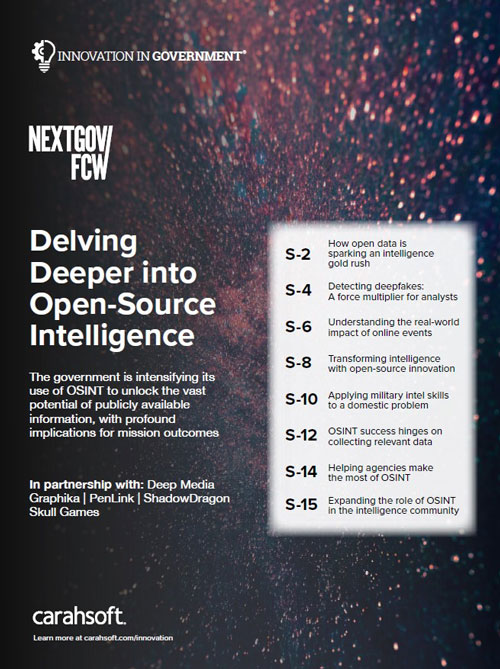Innovation in Government® Report
Delving Deeper into Open-Source Intelligence
The use of open-source intelligence (OSINT) dates to the 1930s, when newspapers and TV and radio broadcasts were the main resources for governments that wanted to keep track of world events and potential threats. Fast forward to today, when social media, geospatial imagery and online videos have proliferated, and OSINT takes on a whole new urgency and complexity.
The Office of the Director of National Intelligence (ODNI) defines OSINT as “intelligence derived exclusively from publicly or commercially available information that addresses specific intelligence priorities, requirements or gaps.”
Finding ways to collect and share vital intelligence while protecting individuals’ privacy is a central challenge for the government. The Public-Private Analytic Exchange Program released a report in 2022 titled “Ethical Frameworks in Open Source Intelligence.” The program, which is sponsored by the Department of Homeland Security on behalf of ODNI, brings together government analysts and private-sector partners to explore how they can work in tandem on issues of mutual concern.
The OSINT report notes that there are no national or international guidelines for how information from social media in particular is collected and analyzed, and the public and private sectors take different approaches to related legislation and ethics. “Without a standard policy or framework in place specific to security practices, intelligence analysts and investigators may unknowingly pursue unethical routes to propel their organization’s mission or goal,” the report states.
“OSINT informs the decisions of senior policymakers on nearly every major issue facing the United States,” wrote William Burns, OSINT functional manager for the intelligence community. He added that the community’s OSINT strategy “will help us fulfill our responsibilities and increase the already tremendous impact that the OSINT discipline is having on the safety and security of our nation.”
Read the latest insights from OSINT thought leaders, including
- Rijul Gupta, Founder and CEO of Deep Media, details how generative AI is speeding the manipulation of online media, but modern tools can separate fact from fiction
- Guyte McCord, CEO of Graphika, demonstrates how by mapping the Cybersocial Terrain, agencies can identify who is driving online activity and what communities are impacted
- Kellen Schollaert, Director of Strategy and Enablement at PenLink, discusses how advancements in collection and analysis of open-source data provide analysts with actionable information faster
- Jeff Tiegs, President and Founder of Skull Games, explains how a nonprofit organization led by veterans is using open-source intelligence to identify sex trafficking victims and predators
- Jonathan Couch, Chief Operating Officer at ShadowDragon, highlights how A targeted approach that respects individuals’ privacy is crucial for turning reliable information into intelligence
Read more insights from ̽����Ƶ and our OSINT partners when you download the full report:
Read more insights from ̽����Ƶ and our OSINT partners when you download the full report:
By supplying my contact information, I authorize ̽����Ƶ and its vendors and partner community to contact me with personalized communications about their products and services. Please review our Privacy Policy for more details or to opt-out at any time.